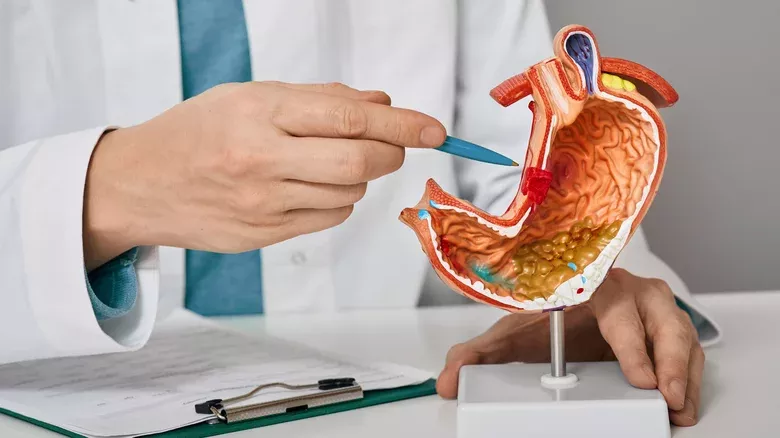Of all the conditions out there that can affect your stomach, an ulcer has to be up there with the most irritating, as well as the most common.
Every year, over 4 million Americans experience a peptic ulcer (with around 10% of all people having one throughout their lives), with duodenal and stomach ulcers commonly causing pain and discomfort (per Harvard Health Publishing).
And once you have an ulcer, they're pretty difficult to ignore, with symptoms often only completely abating with medication and advice from your doctor.
But here's the thing: How do you know you have an ulcer in the first place? One of the most confusing things about duodenal and stomach ulcers is how similar their symptoms are to a range of other conditions and causes, and it's easy to write off things like heartburn or that sense of fullness as something that you ate. That's why we decided to put together a list of signs that might indicate you have an ulcer, from the common to the more surprising, so you can make sure you spot it early.
Why do ulcers happen in the first place?
Our stomachs are well-equipped to deal with the food and drink we throw at them every day, but now and again, things can get on top of them a little — and that's when an ulcer can start to form.
Ulcers are generally not caused by food, however, but by a few specific factors that can damage the coating in our stomach, leaving the lining more vulnerable (per the National Institute of Diabetes and Digestive and Kidney Diseases).
One of the more common causes is the frequent use of NSAIDs like ibuprofen or aspirin, which in trying to combat inflammation and pain can also make your stomach more vulnerable to damage, including ulcers.
Infection by the bacteria H. pylori can also result in an ulcer forming, as the bacteria and your stomach acid coalesce to work through your stomach lining and irritate the flesh.
Another cause is Zollinger-Ellison syndrome, which causes tumor growth in your gastric system, although this is relatively uncommon. Ulcers may also, in some cases, be caused by higher levels of stress, and stress may also worsen already-formed ulcers, says Medical News Today.
Stomach pain is one of the most frequent symptoms of an ulcer
Given that gastric ulcers are defined as sores in your stomach lining, it makes sense that your stomach might be a little "sore" (see what we did there?) due to this condition. And in fact, pain in the stomach area is one of the first things you should be looking out for if you suspect an ulcer, says Healthline.
Caused by the contact your stomach acid makes with your ulcer sores, this pain will generally feel like a burning sensation, and will usually manifest in the middle of your torso and stomach area, somewhere between your navel and chest. You may also notice that the pain is worse before you've eaten anything, or if you haven't eaten in a long time.




